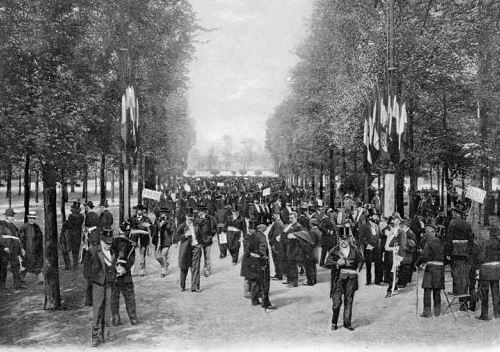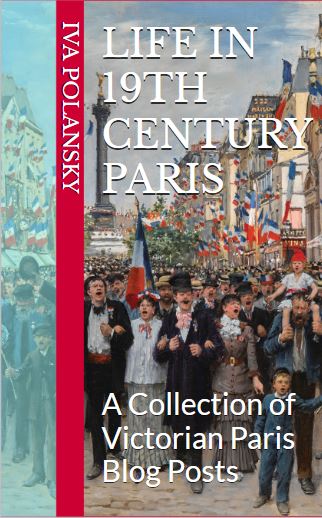 From Innocents Abroad by Mark Twain
From Innocents Abroad by Mark Twain
Text written in 1867 on the occasion of the Exposition Universelle
***
Presently there was a sound of distant music; in another minute a pillar of dust came moving slowly toward us; a moment more and then, with colors flying and a grand crash of military music, a gallant array of cavalrymen emerged from the dust and came down the street on a gentle trot. After them came a long line of artillery; then more cavalry, in splendid uniforms; and then their imperial majesties Napoleon III and Abdul Aziz. The vast concourse of people swung their hats and shouted–the windows and housetops in the wide vicinity burst into a snowstorm of waving handkerchiefs, and the wavers of the same mingled their cheers with those of the masses below. It was a stirring spectacle.
But the two central figures claimed all my attention. Was ever such a contrast set up before a multitude till then? Napoleon in military uniform–a long-bodied, short-legged man, fiercely moustached, old, wrinkled, with eyes half closed, and such a deep, crafty, scheming expression about them!–Napoleon, bowing ever so gently to the loud plaudits, and watching everything and everybody with his cat eyes from under his depressed hat brim, as if to discover any sign that those cheers were not heartfelt and cordial. Abdul Aziz, absolute lord of the Ottoman empire–clad in dark green. European clothes, almost without ornament or insignia of rank; a red Turkish fez on his head; a short, stout, dark man, black-bearded, black-eyed, stupid, unprepossessing–a man whose whole appearance somehow suggested that if he only had a cleaver in his hand and a white apron on, one would not be at all surprised to hear him say: “A mutton roast today, or will you have a nice porterhouse steak?” Napoleon III, the representative of the highest modern civilization, progress, and refinement; Abdul-Aziz, the representative of a people by nature and training filthy, brutish, ignorant, unprogressive, superstitious–and a government whose Three Graces are Tyranny, Rapacity, Blood.
Here in brilliant Paris, under this majestic Arch of Triumph, the First Century greets the Nineteenth! NAPOLEON III., Emperor of France! Surrounded by shouting thousands, by military pomp, by the splendors of his capital city, and companioned by kings and princes–this is the man who was sneered at and reviled and called Bastard–yet who was dreaming of a crown and an empire all the while; who was driven into exile–but carried his dreams with him; who associated with the common herd in America and ran foot races for a wager–but still sat upon a throne in fancy; who braved every danger to go to his dying mother–and grieved that she could not be spared to see him cast aside his plebeian vestments for the purple of royalty; who kept his faithful watch and walked his weary beat a common policeman of London–but dreamed the while of a coming night when he should tread the long-drawn corridors of the Tuileries; who made the miserable fiasco of Strasbourg; saw his poor, shabby eagle, forgetful of its lesson, refuse to perch upon his shoulder; delivered his carefully prepared, sententious burst of eloquence upon unsympathetic ears; found himself a prisoner, the butt of small wits, a mark for the pitiless ridicule of all the world–yet went on dreaming of coronations and splendid pageants as before; who lay a forgotten captive in the dungeons of Ham–and still schemed and planned and pondered over future glory and future power; President of France at last! a coup d’etat, and surrounded by applauding armies, welcomed by the thunders of cannon, he mounts a throne and waves before an astounded world the sceptre of a mighty empire! Who talks of the marvels of fiction? Who speaks of the wonders of romance? Who prates of the tame achievements of Aladdin and the Magii of Arabia?
ABDUL-AZIZ, Sultan of Turkey, Lord of the Ottoman Empire! Born to a throne; weak, stupid, ignorant, almost, as his meanest slave; chief of a vast royalty, yet the puppet of his Premier and the obedient child of a tyrannical mother; a man who sits upon a throne–the beck of whose finger moves navies and armies–who holds in his hands the power of life and death over millions–yet who sleeps, sleeps, eats, eats, idles with his eight hundred concubines, and when he is surfeited with eating and sleeping and idling, and would rouse up and take the reins of government and threaten to be a sultan, is charmed from his purpose by wary Fuad Pacha with a pretty plan for a new palace or a new ship–charmed away with a new toy, like any other restless child; a man who sees his people robbed and oppressed by soulless tax-gatherers, but speaks no word to save them; who believes in gnomes and genii and the wild fables of The Arabian Nights, but has small regard for the mighty magicians of to-day, and is nervous in the presence of their mysterious railroads and steamboats and telegraphs; who would see undone in Egypt all that great Mehemet Ali achieved, and would prefer rather to forget than emulate him; a man who found his great empire a blot upon the earth–a degraded, poverty-stricken, miserable, infamous agglomeration of ignorance, crime, and brutality–and will idle away the allotted days of his trivial life and then pass to the dust and the worms and leave it so!
Napoleon has augmented the commercial prosperity of France in ten years to such a degree that figures can hardly compute it. He has rebuilt Paris and has partly rebuilt every city in the state. He condemns a whole street at a time, assesses the damages, pays them, and rebuilds superbly. Then speculators buy up the ground and sell, but the original owner is given the first choice by the government at a stated price before the speculator is permitted to purchase. But above all things, he has taken the sole control of the empire of France into his hands and made it a tolerably free land–for people who will not attempt to go too far in meddling with government affairs. No country offers greater security to life and property than France, and one has all the freedom he wants, but no license–no license to interfere with anybody or make anyone uncomfortable. As for the Sultan, one could set a trap anywhere and catch a dozen abler men in a night.
The bands struck up, and the brilliant adventurer, Napoleon III., the genius of Energy, Persistence, Enterprise; and the feeble Abdul-Aziz, the genius of Ignorance, Bigotry, and Indolence, prepared for the Forward–March! We saw the splendid review, we saw the white-moustached old Crimean soldier, Canrobert, Marshal of France, we saw–well, we saw everything, and then we went home satisfied.
Related Posts:
Read Full Post »









































